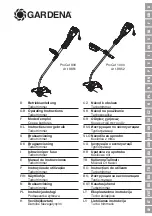
GB-4
equipment as a dust mask, nonslip safety
shoes, safety helmet or ear protectors (de-
pending on the type and use of the tool)
reduces the risk of injury.
c) Avoid unintentional operation. Make
sure that the switch is in ‘OFF’ position
before pulling the plug from the mains
socket.
When carrying the tool with your
finger on the on/off switch or connecting the
tool to the mains supply with the switch in
‘ON’ position, this may result in accidents.
d) Remove adjustment tools or wrenches
and the like before you switch the tool
on.
A wrench or another tool that is inside
or on a turning part of the tool may cause
injury.
e) Do not overestimate your abilities. Take
care of a safe footing and keep your bal-
ance at all times.
This will allow you to bet-
ter control the tool in unexpected situations.
f) Wear suitable clothes. Do not wear wide
clothing or jewellery. Keep your hair,
clothes and gloves clear of all moving
parts.
Loose clothing, jewellery or long hair
may get caught in moving parts.
g) If dust extraction/collection devices are
provided make sure that they are con-
nected and used properly.
The use of
these devices reduces hazards caused by
dust.
4) Careful handling and use of power tools
a) Do not overtax the power tool. Use the
power tool intended for your type of
work in each case.
The use of the suit-
able power tool within the stated range of
performance makes working more effective
and safer.
b) Do not use a power tool with a dam-
aged switch.
A power tool that cannot be
switched on or off any more is dangerous
and must be repaired.
c) Pull the mains plug out of the socket be-
fore you adjust a tool, change accesso
-
ries or put the tool aside.
This precaution
avoids the unintentional start of the tool.
d) Store power tools out of the reach of
children. Do not allow persons to use
the tool if they are not familiar with the
tool or these instructions.
Power tools
are dangerous if used by inexperienced
persons.
e) Thoroughly maintain your power tool.
Check whether moving parts are work-
ing properly and are not jamming/stick-
ing, and whether parts are broken or oth
-
erwise damaged in a way that affects the
function of the tool. Have damaged parts
repaired before using the tool.
Many ac-
cidents are the result of poorly maintained
power tools.
f) Keep cutting tools sharp and clean.
Thoroughly looked-after cutting tools with
sharp cutting edges are jamming less often
and are easier to guide.
g)
Use power tools, accessories, add-on
tools, etc. in accordance with these in
-
structions and in the way prescribed for
the respective type of tool. You should
also consider the working conditions
and the work to be carried out.
The use of
power tools for purposes other than those
intended for the respective tool may result
in dangerous situations.
5) Service
a) Have the power tool serviced by quali-
fied technical personnel only; repairs
should be carried out using exclusively
original spare parts.
This will ensure the
safe operation of the power tool.
Safety instructions for hedge trimmers:
-
Keep all parts of your body away from the
cutting blades. Do not try to remove cut-off
matter with the tool running. Do not try to
hold material to be cut off with your hand.
Remove cut-off matter that is stuck be-
tween the blades only with the tool being
switched off!
When working with hedge trim-
mers even a short moment of inattentiveness
may result in severe injury.
-
Hold the power tool by its insulated han-
dling surfaces as the cutting blades might
get in touch with the tool’s own power
cable.
If the cutting blades should acciden-
tally cut into a live power cable this might turn
metal parts of the tool ‘hot’ thereby causing an
electric shock.
-
Carry the hedge trimmer at the handle with
the cutting blades standing still. Always
put on the protection cover when trans-
porting or storing the hedge trimmer.
Care-
ful handling reduces the risk of injury through
the cutting blades.
GB
| Operating Instructions
















































